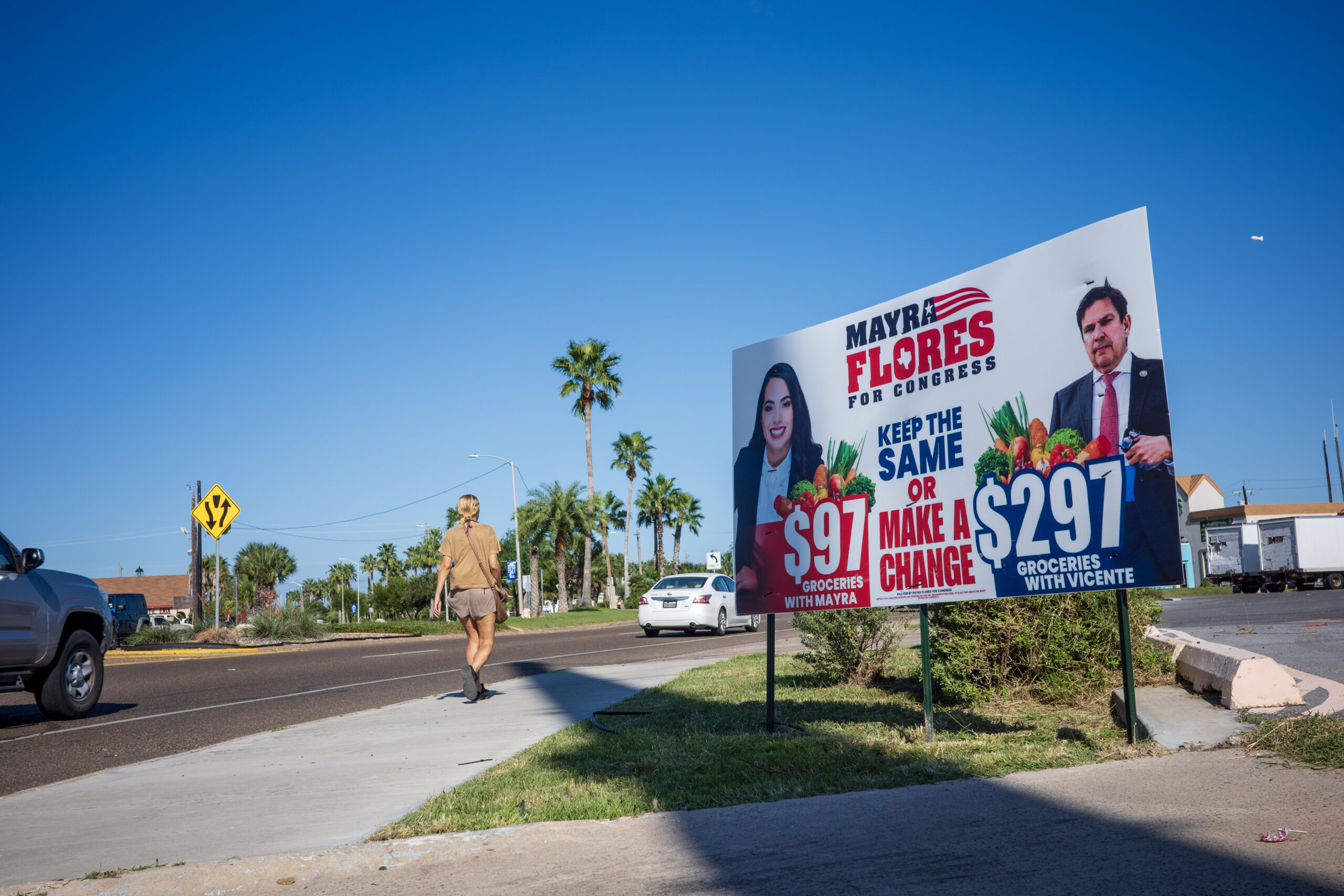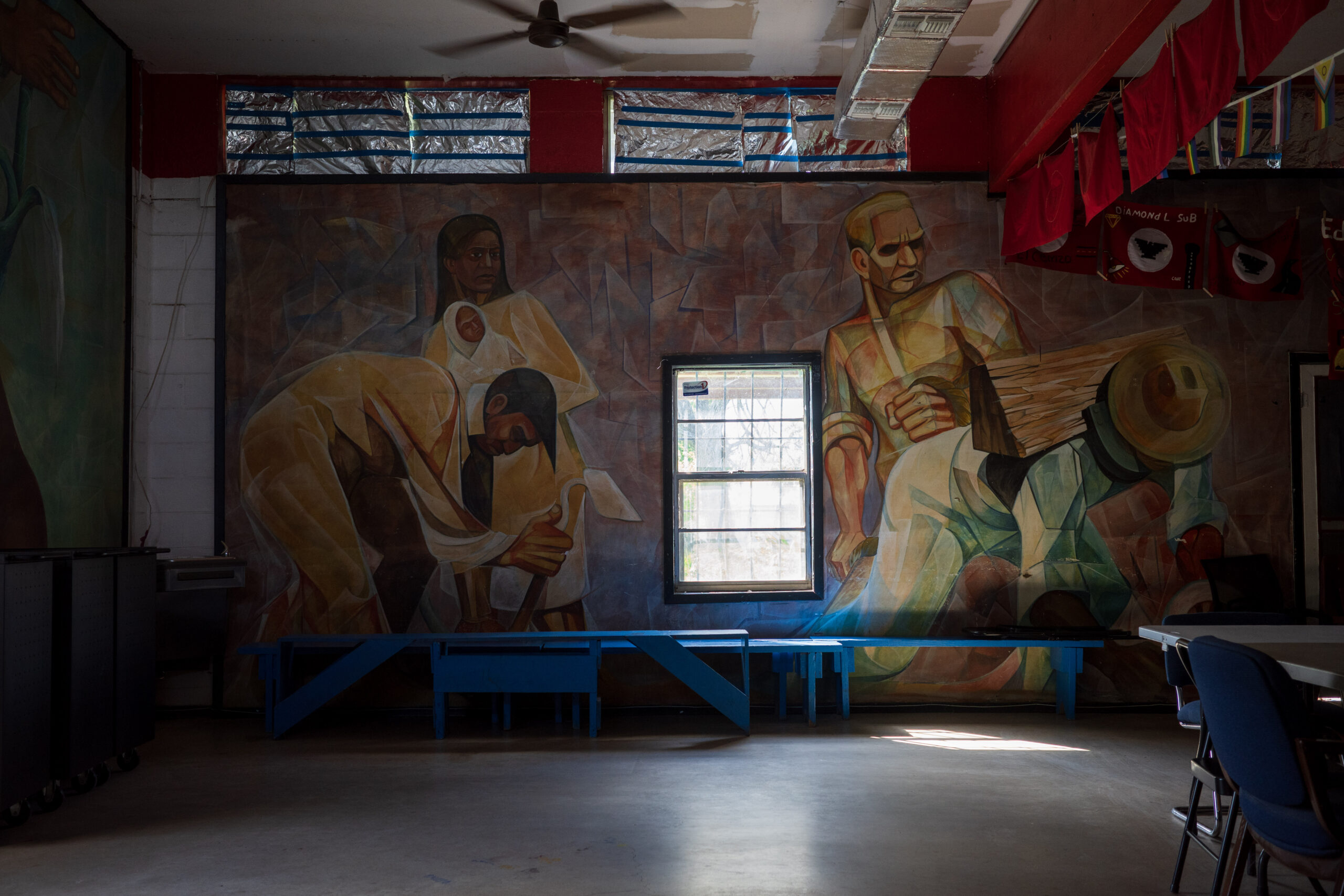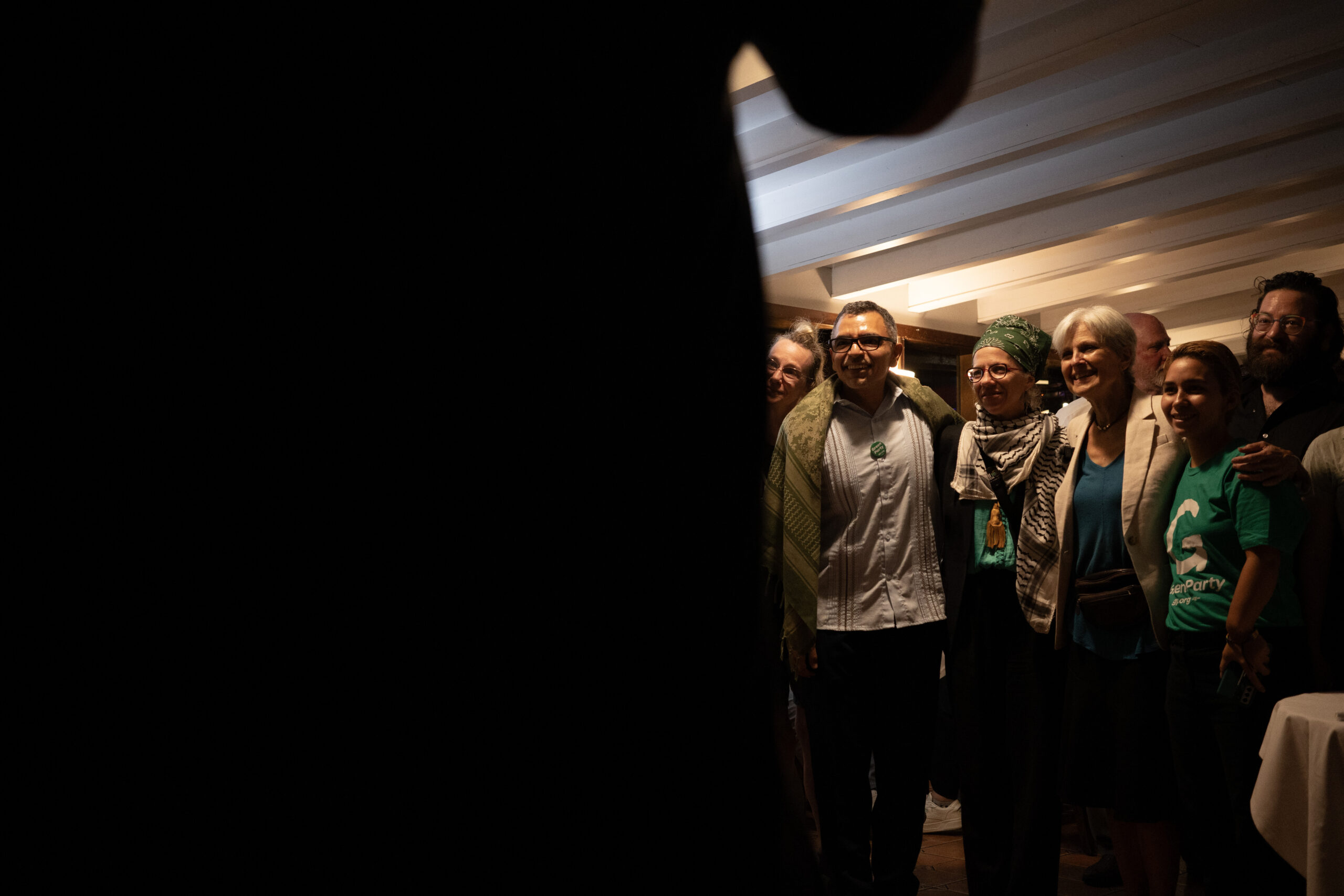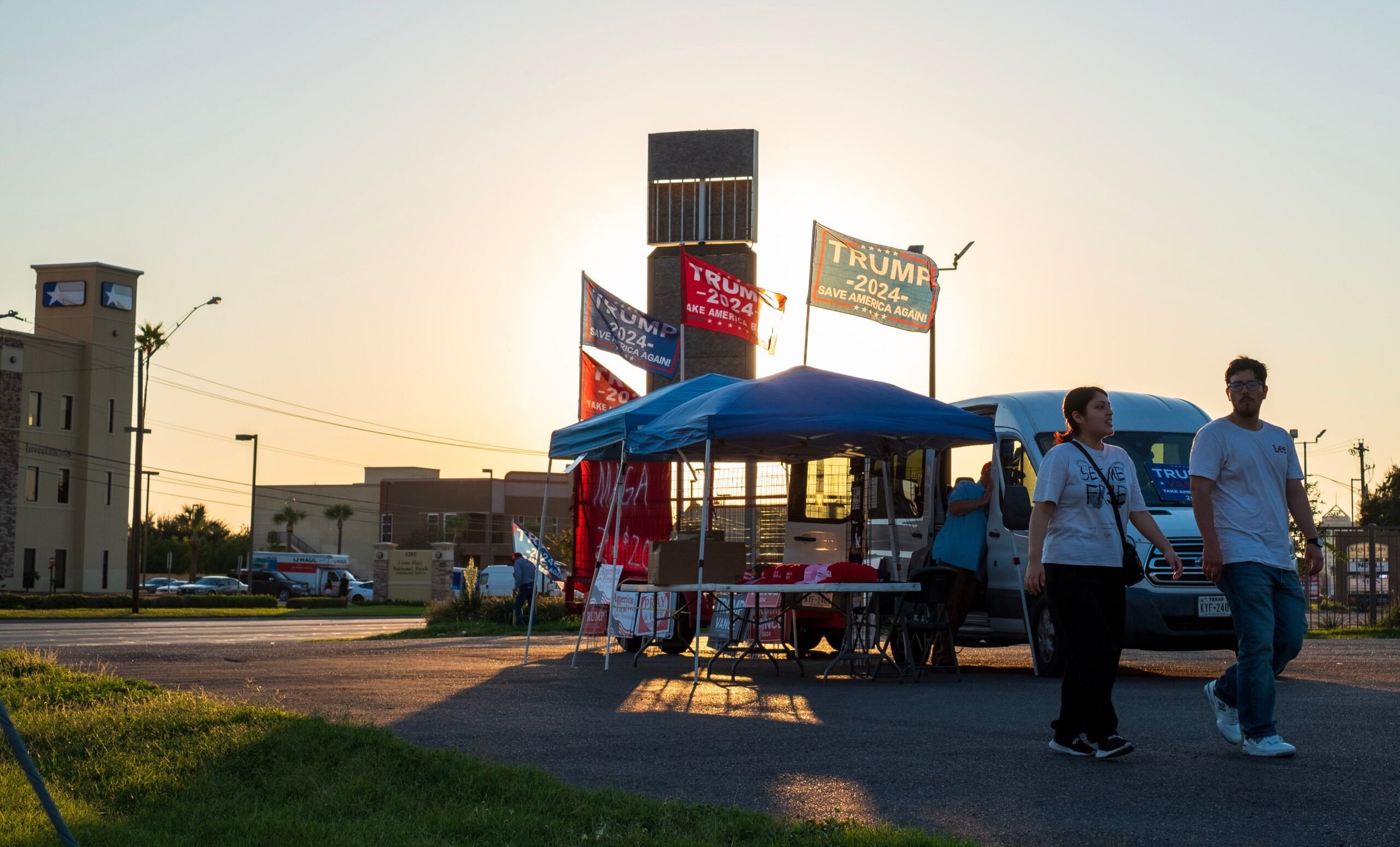On a warm, late September evening in downtown Harlingen, members of the Cameron County Republican Party gathered for a monthly meeting in the city’s former post office.
The group of 20 or so attendees, most of them precinct chairs, gathered in the building’s lobby, the latest space in a routinely shifting meeting location. A stack of Trump-Vance yard signs were at a table in front, where Cameron County Republican Party Chairwoman Deborah Bell sat with two precinct leaders. These Republican signs are in high demand from local GOP supporters, as more Harris-Walz signs appear across the Rio Grande Valley, the four-county region of 1.4 million people at Texas’ southern tip, which is anchored by Brownsville in Cameron County and the McAllen-metro in Hidalgo County.
Cameron County’s Democratic Party, Bell said, was outraising its GOP counterpart, helped by a donation from George Soros, the Hungarian billionaire and oft-cited figure in right wing conspiracies. As Bell went through updates, a campaign staffer for Mayra Flores—a repeat GOP candidate for Congressional District 34, a seat rooted in Brownsville and Harlingen, which she briefly held after a special election in 2022—mentioned signs calling the candidate “Mayra Mentiras” all over the county. The signs came from the campaign of her Democratic opponent, incumbent Congressman Vicente Gonzalez. Signs notwithstanding, the staffer said, Cameron County was soon turning red—so long as the elections were run cleanly.
Bell said she and the Hidalgo County GOP were requesting an election inspector for their local races. “The more eyes we have, the better,” she said.

These mentions of Soros, election tampering, and attack ads were reminiscent of the 2022 midterms in the Rio Grande Valley, a region that has long elected Democrats almost exclusively with a preference for those on the party’s conservative end. That was a time when GOP boosters said a “red wave” was coming—after Donald Trump had fared much better in the Valley in the 2020 election than he had in 2016—to dislodge entrenched Democratic rule. Dems, the narrative went, would learn that the area was more conservative than the societal changes the party was embracing.
The GOP began increasing in-person outreach just as Democrats were pulling back amid the COVID-19 pandemic. Rather than appeal solely to the identities of the mostly Latinos that live in the Valley, Republicans acknowledged how they survive: off oil and gas, farming and law enforcement jobs. This meant recognizing that Texas Latinos–Tejanos–are not like Latinos across the United States and are not, as is often said, a monolith.
But the red wave didn’t happen, at least not to the extent Republicans hoped. Instead, the GOP flipped just one congressional district, which had been redrawn for a Republican win, via insurance agent and now Congress member Monica De La Cruz. And the GOP picked up a state House seat rooted in Cameron County via former school board member and now Representative Janie Lopez, a race in which Dems invested comparatively scant resources. In McAllen, former Hidalgo Republican Party Chair Javier Villlobos won the nonpartisan mayoral seat.
The former Cameron County GOP Chair said the “red wave” didn’t materialize because the party’s investment in the area was limited to federal races and was not an investment in the GOP regionally. The Democrats, specifically the moderate types that already dominated, remained the majority.
Still, the fact remains that Trump cut his deficit in the Valley by more than half from 2016 to 2020, and increased GOP presence, or of Trump at least, in the region is undeniable. Billboards for Trump cycle along Highway 83, the Valley’s main expressway. So-called Trump Trains, parades of Trump-flag-adorned vehicles driving down main roads, have been happening nearly every weekend for the last month.
Compared to 2022, there’s less bullishness now about a coming wave, but the Republican Party still sees the region as part of the party’s future and is continuing its outreach there. In response, Democrats, along the same lines as Vice President Kamala Harris, are now appealing to the moderate and undecided. Two years after the wave that wasn’t, Republicans here seem to have pulled local Democrats even further rightward, as GOP candidates in tight contests, while bound to Trump, also seek to tack toward the center on some issues.
On a rainy October day, Republicans gathered at a bar in Harlingen for a get-out-the-vote rally for Mayra Flores. GOP U.S. House Speaker Mike Johnson, the event’s headliner, called Flores the “future of America.” That same day, Johnson headlined another event for Monica De La Cruz, who’s seeking reelection against the opponent she beat in 2022, Democrat Michelle Vallejo. This event was some 250 miles up the road in Seguin, which is closer to San Antonio than the Valley and key to the Republican gerrymander of De La Cruz’s seat, Congressional District 15.
Two days before, the National Republican Congressional Committee (NRCC) opened a “battleground station” in Weslaco, which is in Congressional District 34, the one held by Vicente Gonzalez and sought by Flores. The events were almost 3 years to the day after the Republican National Committee (RNC) opened a “Hispanic Engagement Center” in McAllen. (That center has since closed and moved to nearby Edinburg.)
As Republicans continue their investment in the area, doubling down on their Latinidad and calling for lower prices at the grocery store, Democrats are more staunchly embracing border security. In particular, Vallejo, the CD-15 Democrat, has shifted out of the progressive lane she occupied in her failed 2022 bid.
“What’s jumping out at me is a sort of flipping of the script,” Alvaro Corral, a political science professor at the University of Texas Rio Grande Valley (UTRGV) told the Texas Observer. “Democrats looking and sounding a lot more like Republicans and Republicans sounding a lot more like Democrats, in some respects.”
For the most part, this is simply a reinforcement of the already dominant tendency of Democrats in this region, embodied by right-wing Democrats like Congressman Henry Cuellar, whose district includes a western portion of the Valley, and retired Brownsville state Senator Eddie Lucio.
Lucio’s old seat, Senate District 27, is held now by one-term Democrat Morgan LaMantia, but Corpus Christi (in the district’s northern reaches) Republican businessman Adam Hinojosa, whom LaMantia narrowly defeated in 2022, is aiming to unseat her in November. Lucio, who long voted against abortion access and LGBTQ+ rights, endorsed LaMantia last cycle but has now endorsed her GOP challenger.
“Being a border Democrat, we’re much more conservative on the spectrum compared to the entire state,” Jonathan Gracia, an attorney and former justice of the peace, told the Observer at his downtown Brownsville office.
Gracia is the Democratic nominee for state House District 37, which was flipped two years ago by Janie Lopez. Abbott and Republican-supporting PACs are pouring money into Lopez’s campaign, whose contributions dwarf Gracia’s as of the most recent filings, though Gracia has also loaned his campaign a fair chunk of change.
Gracia, whose wife is a teacher, is heavily focused on public school funding and opposing the voucher system championed by Abbott and Lopez. Gracia also campaigns on increasing border security: “I’m not afraid to be able to lean into this,” he said. “This is not an issue that the Republican Party has complete dominion over. I’m in agreement with it.”
Valley residents have long watched far-away officials talk about the border and those who cross it in abstractions, rarely acknowledging that many residents traverse international bridges as often as they go to grocery stores. Brownsville and McAllen-area ports of entry look nothing like the pseudo-war zones of Eagle Pass created by Texas Governor Greg Abbott’s Operation Lone Star. But, for the last few years, the detached border security language more common to the national stage has permeated the more complex politics of this region.
In a recent ad, Vallejo, who two years ago specifically campaigned against border militarization, sounded like so many non-local politicians who use the region as a rhetorical prop, saying the area “is being overwhelmed by the chaos at the border” and calling for thousands more Border Patrol agents. (Border arrests have fallen sharply since January.)
Corral noted that Vallejo’s ad was in line with the strategy of U.S. Senate candidate Colin Allred, who has praised new border wall construction—something Allred previously called “racist”—in the Valley. “She’s sort of been put in a box by Republicans winning on the [border] issue in the last couple of years and a Senate candidate trying to win an election in the state,” Corral said.
Though they are now closer in line with Republican views, Vallejo’s ad and Democratic border stances are being mocked by the GOP. De La Cruz’s campaign called Vallejo’s border security-focused ad a “disingenuous about-face.” Hidalgo County’s Republican Party said that Kamala Harris was “saying anything to get elected” in reference to the presidential candidate’s border proposals.
“There’s this kind of mythical white whale, as it were, for Republicans…”
CD-15 is rated as a likely Republican hold, but a House Majority PAC poll showed Vallejo within 3 points of De La Cruz, a much thinner margin than Vallejo’s 9-point defeat last cycle.
De La Cruz, meanwhile, appears to be following other Republicans nationwide in running away from past views on abortion. She supports some exceptions for the procedure after once indicating she approved of the state’s abortion ban. Her “pro-life” policy aims, once featured proudly on her campaign website, have since been removed. Flores has made similar adjustments.
For Flores, a major proponent of the “red wave” narrative in 2022, her brand of being a Mexican-born woman in the RGV who wants more border security is still popular. This cycle she’s received training and $800,000 in ads from the NRCC, who are intent on flipping the CD-34 seat after Flores lost in 2022 by 8 points. She has outraised the incumbent Gonzalez in political contributions, as of mid-October, by over $2 million. She’s run ads that tout her background as a legal immigrant, while also spreading anti-trans propaganda.
Specifically, Flores has accused Gonzalez of voting to approve “sex changes for our children,” referring to a bill to expand discrimination protections based on gender identity, in addition to attacking him for opposing a ban on Defense Department coverage of gender-affirming treatment for military families.
“They’re underestimating the Latino community here in South Texas,” Gonzalez told the Observer in a phone call. “I think it’s insulting. These are people in Washington, D.C., that look down on the community here and think, ‘We can run these crazy ridiculous ads and they’re so stupid, they’re gonna believe it.’”
Gonzalez’s campaign made the “Mayra Mentiras” signs in response to these accusations and a debacle involving Flores allegedly lying about living a ranchera lifestyle on social media. Flores’ campaign has also deployed a sign claiming that an undefined amount of groceries cost $97 while Flores was (briefly) in Congress but is now $297 under Gonzalez. Flores’ campaign did not respond to the Observer’s question asking where those figures came from.
Michael Mireles is the civic engagement director for LUPE Votes, a fairly new 501(c)(4) organization spun off from a longstanding Valley nonprofit, which helped launch Vallejo’s initial, more progressive bid for office and is supporting her again.
As his organization knocks doors advocating for Democrats, Mireles said, residents mostly talk about kitchen table issues: jobs, education, healthcare. “You’ll find that a lot of folks, more often than not, just want to know how their lives, their household, is going to fare with either administration.”

Internal survey data collected in September by Equis, a Latino-focused electoral research organization, and shared with the Observer, shows cost of living as the top issue concerning Texas Latinos, at 43 percent. A third of the respondents were from a handful of deep South Texas counties including the Valley, 46 percent of whom said cost of living was top of mind. Immigration came second, but only at 11 percent—or 13 percent for the Valley portion. Abortion rights ranked in single digits.
Statewide, the poll showed similar levels of support among Texas Latinos for Harris to what Biden received in 2020, suggesting the GOP may have plateaued. “I think it kind of cuts away at the idea that there is a broad realignment of support [among Latino Texans],” said Maria Isabel Di Franco Quiñonez, Equis’ Research Director.
Ultimately, Latinos in Texas—the Valley included—may simply remain a somewhat Democratic group, not amenable to GOP takeover yet not providing the kind of consistent supermajorities that Dems once hoped for either.
“There’s this kind of mythical white whale, as it were, for Republicans, that they’re somehow going to capture a plurality, if not a majority, of Latino voters in Texas because of social issues,” Jon Taylor, the chair of the University of Texas San Antonio’s political science department, told the Observer.
The cult of personality around Trump is also a significant force in Republican turnout in the Valley and generally. If Trump loses, and he keeps his word that he won’t run again, future GOP turnout in the Valley may go down.
“Latinos in Texas tend to still be Democratic. Are they possibly less so on the border? Sure. But is that a long-term trend, or is that a Trump trend that goes away once Trump’s out of power and, therefore, does not attract particular Latino men of a particular age category?” Taylor asked. “If it doesn’t attract them after he’s gone, it makes you wonder how sustainable this attempt to try to move South Texas, particularly the Valley, a bit more red is.”
What’s missing almost entirely from Valley campaigns right now is a true progressive lane, like that held by Vallejo in 2022. Candidates are almost completely ignoring environmental justice issues such as residents’ frustrations with the SpaceX and liquefied natural gas (LNG) projects along the Valley’s coast, despite years of community organizing. Local organizing for Palestinians is also often ignored or dismissed by officials and candidates.
“The left tends to vote because there’s hope. It’s the right that votes in resentment,” said Monica Clua, a political economy professor in Barcelona, Spain, who used to teach at UTRGV. “So if you want to have a successful left strategy, you need to provide hope.”
On October 1, at a local bar on Brownsville’s north end, Jill Stein, the Green Party’s presidential nominee, admonished Elon Musk, oil and gas projects, and Operation Lone Star to a small crowd of organizers and residents disenchanted with Democrats and Republicans. “The rebellion is really taking hold here, that people are standing up with incredible courage of their convictions,” Stein told the Observer after being asked what she thought of the Valley.

The Green Party has two candidates from the Valley this cycle: Robin Lee Vargas, from Alamo, running in SD-27, and Eddie Espinoza, of Pharr, running for a seat on the Texas Railroad Commission. They won’t win, of course, but winning isn’t necessarily the goal. Locally, the Green Party wants the Valley, where disenchantment fuels low voter turnout, to engage in electoral politics.
“A lot of people hate politics, they don’t want to participate,” Vargas told the Observer after Stein’s speech. “They think it’s a failed system. They think it’s a corrupt system. And we don’t want them to think like that.”
As Democrats move to the center, hoping to pick up on holdouts, Trump, in turn, has gotten increasingly authoritarian. His now better-laid plans for mass deportations would wreak havoc on a place like the Valley.
Earlier this month, Mayra Flores attended a “Hispanic Roundtable” with Trump in Las Vegas. Trump talked mostly about immigration, lying about migrants coming from countries “emptying prisons.” But he didn’t mention those mass deportation plans while he sat alongside Flores.
Neither do the Valley’s GOP candidates mention this core promise of Trump’s presidential bid as they campaign in the final stretch of the 2024 election. In America’s past, similar operations have swept up not just the undocumented but also Latino U.S. citizens. Flores said in Vegas that Trump would receive more votes from Hispanics than any other Republican presidential candidate before him. “I truly believe that,” Flores said to applause.
It was a confident prediction, akin to the “red wave” promise she made in 2022. It was a hope, perhaps, that Republican Latinos would be spared.


